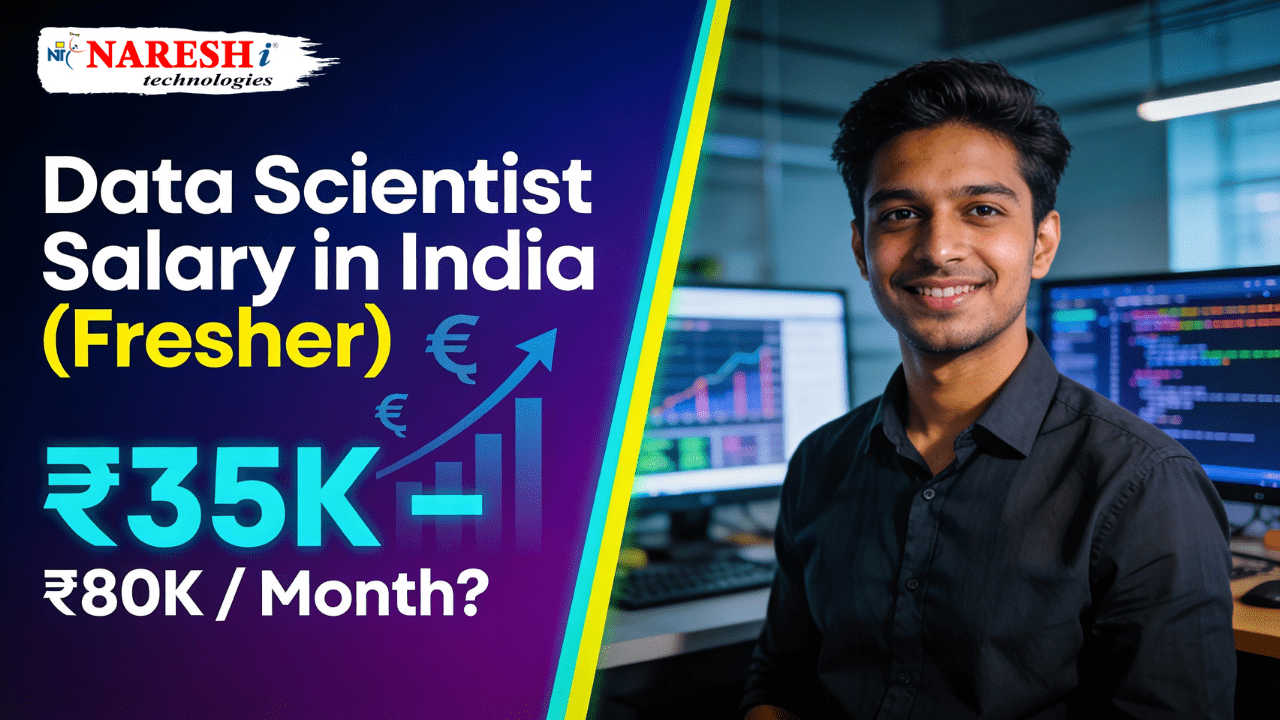
Introduction
A lot of newcomers ask, “Is DevOps easy to learn?” The short answer is yes – assuming you have an appropriate roadmap and you work with realtime tools. DevOps is more than just being a coder; it is collaborative, automation and also some cloud infrastructure. Anyone can learn it with support – students, working professionals or career changers.
At Naresh i Technologies, we get you started with hands-on projects and support from a mentor in our DevOps Training with Placement assistance and DevOps with AWS Training programs. With these you will get cloud, automation and deployment so that you can communities stick instructors to learn DevOps.
Who Can Start Learning DevOps Without Coding?
You don’t have to already be a developer to get started. DevOps will resonate with anyone with an interest in cloud computing, automation, or IT operations.
- Students / freshers: Gain exposure to the fundamentals, and build your skills gradually over time.
- Working professionals: Transition from QA / SysAdmin / Support roles into DevOps Engineer roles.
- Career switchers: You can bring your experience in a domain, and focus on learning how to use specific tools, instead of focusing on the heavy coding involved in DevOps.
If you enjoy solving problems, and want to build a career in a fast-growing area of technology, DevOps could be a great alley for you.
What Are the Core DevOps Skills for Beginners?
When learning DevOps, it is best to start with the simplest skills first and then build them up to the more complicated skills.
Technical Skills
- Linux & Networking Basics: The commands for the Linux operating system as well as system permission.
- Git & Version Control: To manage your code as well as collaborate with your team.
- Containers & Orchestration: Platforms like Docker and Kubernetes that provide us with the ability to package, then deploy software.
- Infrastructure as Code: Automation using tools like Terraform & Ansible to automate your code.
- Cloud Platforms: Use AWS to start then learn about Azure and Google Cloud.
Soft Skills
Collaboration, communication & analytical thinking will count for a lot to any dev ops team realizing their operational excellence objectives.
These are soft skills you will be learning and using in practical experiences in NareshIT’s dev ops training with placement. They will help you build experience in projects.
When Should You Begin Learning DevOps?
Now is the moment to get started. The demand for DevOps-related skills is rapidly increasing in India according to the current trajectory of the market as companies move to cloud and automation.
A good schedule for learning the basics of DevOps is:
- Weeks 1-2: Learn the basics of Linux and Git.
- Weeks 3-4: Learn CI/CD concepts using jenkins or GitHub Actions.
- Weeks 5-6: Get a foundational understanding of Docker and Kubernetes.
- Weeks 7-8: Learn to deploy on the AWS cloud and Infrastructure as Code (IaC) using Terraform.
After 2-3 months, you will be in a position to apply for DevOps roles for freshers or internships with placement assistance.
Where are DevOps Job Opportunities in India?
DevOps careers are thriving in India across a number of businesses, including:
- Information & Cloud Consulting
- Fintech and Banking
- Healthcare and E-Commerce
- Education and Media Startups
Jobs you can consider at entry-level are Junior DevOps Engineer, Build Engineer and Cloud Support Associate.The career ladder moves from the entry-level roles to Site Reliability Engineer or DevOps Architect roles.
Why DevOps is Easy for Beginners
DevOps really is easy to approach if you learn it in the right way. Here’s why:
- Tool-based Learning: The majority of DevOps tasks are completing tasks in ready-made tools like Jenkins and specific cloud environments such as AWS and Azure.
- Visual Cloud Dashboards: You can quickly set up and deploy applications without long, drawn-out pieces of code.
- Reusable Scripts: You can write scripts to automate this and use templates, leading to quicker outputs, as opposed to continually writing everything from scratch every time.
- Collaboration: You are collaborating with developers, testers, and admins — not just as an individual contributor without collaboration.
This is why many fresher college graduates select DevOps, to get into the IT industry quickly.
How to Study DevOps Step by Step (Roadmap)
Step 1: Familiarize Yourself with the Fundamentals
Begin to grasp the fundamentals of:
Linux, Git, and some networking concepts.
Step 2: Understanding Automation and CI/CD
To be introduced to automation tools such as Jenkins, GitHub Actions or GitHub CI, and the concepts of Continuous Integration and Continuous Deployment.
Step 3: Understanding Containers and Cloud
Docker for your containers and Kubernetes for orchestrating those containers. We will begin our DevOps career path with your training in AWS, so you can practice with a real cloud and deployments.
Step 4: Familiarize Yourself with Infrastructure as Code
Using Terraform or Ansible to build a repeatable infrastructure.
Step 5: Monitoring and Security
Monitor with Prometheus and Grafana and also get a taste of some of the basic concepts for DevSecOps.
Step 6: Build & Certify Projects
After you have built your two projects to demonstrate automation and a cloud workload, you can then apply for DevOps training (employment placement assistance ) and land your first job as a DevOps Engineer.
DevOps Compensation in India
| Experience | Average Compensation per Year (India) |
|---|---|
| Freshers | ₹ 5 – 7 LPA |
| Mid-Level (3–5 Years) | ₹ 12 – 18 LPA |
| Senior Roles | ₹ 25 LPA and above |
DevOps has more upward momentum for growth than many IT career paths, as it has a skills set that combines cloud, automation, and security. Adding skills in Devops with multicloud could represent far higher in earning potential
Frequently Asked Questions
Q1: Is DevOps simple for beginners?
Ans: Certainly. Before programming, you can start with the basics of tools and the cloud.
Q2: How long will it take to learn DevOps?
Ans: If you focus your practice and projects in 2–3 months you can be ready for entry-level roles.
Q3: Will I need coding experience to learn DevOps?
Ans: No, basic scripting will suffice to start.
Q4: What the best DevOps training in India?
Ans: NareshIT’s DevOps Training with Placement includes real-time projects and 100% job placement assistance.
Q5: What are the best DevOps tools for beginners?
Ans: Jenkins, Git, Docker, Kubernetes, Terraform, Ansible, and the AWS Console.
Conclusion
So, is DevOps difficult to grasp? Yes — if you are self-taught. But not if you learn step by step with proper guidance from expert instructors. If you have access to the right tools, cloud platforms, and some projects, you could foster a good career as a DevOps Engineer in a few months.
Come to Naresh i Technologies, one of India’s most experienced IT training institutes, with a legacy of over 22 years of teaching with the right course, including DevOps with AWS Training and DevOps Training with Placement,get hands on practical sessions with mentor support and 100% job assistance to kick-start your IT career with confidence!
Find out more courses Latest Batches at KPHB.NareshIT.com.




